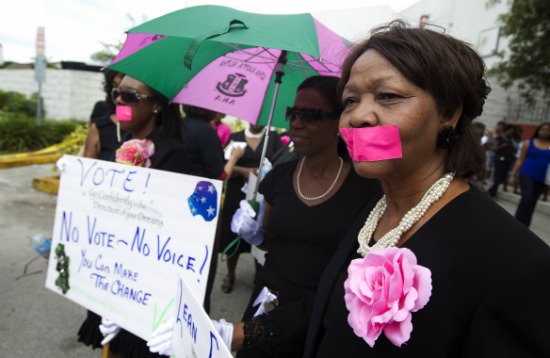JACKSONVILLE, Florida. – On Sunday afternoon, a local television reporter pushed her way through the crowd of voters toward Bishop Edward Robinson. She pleaded for a brief interview. “You’re the first church to arrive in a bus,” she explained. Other Sunday voters had been pouring into the polling station at a local mall on the north side of town, arriving to cast early ballots in the 2012 general election. Robinson had just arrived in a church bus with 30 members of his congregation, Southside Church of God in Christ.
The reporter’s resulting question was simple: Why was today’s voting event so important to Robinson’s and other the African American churches? For the camera, Robinson said black Christians are called to participate in America’s God-given, democratic system. Getting blacks to vote after worshipping helps do that.
But during his sermon just an hour or so earlier, Robinson offered his congregation much more complex and compelling reasons to get on that bus following worship. “Some people say they don’t want politics in the church,” he preached. “Politics is everywhere.” He told his flock that God has given Americans the right to vote, and it’s therefore their responsibility to fight for it when threatened. “Your vote and what you do today determines what our nation becomes,” he said. “Don’t let the obstructionists stand in the way.” He compared getting his congregants to the polls with the freedom rides of the Civil Rights struggle. “Jesus,” he added, “died that we would have rights.”
For years, many black churches have conducted get-out-the-vote efforts among their members, busing them to polling stations to vote early. For a community that suffered disenfranchisement for many years, this civil right has become a kind of sacred rite, taking place on the Sunday before an election. Known frequently as “Souls to the Polls” Sunday, the annual effort has been hampered this year by new laws curtailing early voting in some states—including Florida. The new restrictions have boosted the sense of urgency in some faith communities. When members could no longer vote on Sunday, November 4, churches moved their Souls to the Polls events to October 28 to comply with the new restrictions.
Jacksonville pastors estimated that hundreds of Duval County churches were expected to turn out for this year’s Souls to the Polls, largely from fear of disenfranchisement from new voting laws, which many minorities see aimed directly at them and their tendency to support liberal candidates and causes. One of the new laws in Florida shortened early voting from 14 days to eight. Another makes it harder to for people who have moved to vote if they haven’t submitted a change of address. Also, rumors abound of qualified voters being turned away for no reason.
“Across the state it’s phenomenal,” said the Rev. James B. Sampson, president of the Florida General Baptist Convention, which is part of the National Baptist Convention USA. He said most of the state convention’s 700 churches were expected to mobilize for Souls to the Polls. “And it’s not just the Baptists but the AME, Church of God and Christ, Southern Baptists, the Church of Christ—the entire African American church,” said Sampson, who pastors a Missionary Baptist congregation in Jacksonville.
Of the law’s creators, Elder Rick Cunningham, the organizer of Southside Church of God’s participation, said, “I think that their goal was just to keep people from going [to vote].” But, he said, “When you take something from somebody, they are going to bow up against you.”
Voting rights experts say they, too, have been encouraged by the active response Florida’s black congregations. Deirdre Macnab, state president of the League of Women Voters, said the churches have shined a ray of clarity in a state described as having a confusing election atmosphere. “Florida can be a whacky place” when it comes to election laws, she said.
The Florida legislature dealt voting rights organizations a blow when they passed a law making it almost impossible for non-party groups to register voters. The law was overturned, but caused a delay that may have resulted in preventing 100,000 from participating in this election. “And for no good reason they eliminated the single most popular early voting day, which was the Sunday before the election,” Macnab said.
Confusion has set in to the point that even those voters who are in good standing are being led to question their eligibility, which could deter voters from the polls. According to Macnab, black churches have been vital in educating voters on the changes. “They have been energized and I think they are doing their absolute utmost to help their parishioners steer through the stormy seas of the legislature’s efforts to make democracy harder in Florida.”
At the polling station, the line was never less than 40 people long. Voters reported the experience taking half an hour. Joseph Mims, a member of Southside Church of God, said, “It was actually fun—it was like you were out here with your family.” Another church member, Geneva Young, said it was powerful to go from church to voting with fellow congregants and those from many other parishes. It put voting in a different context for her. “You look at it as if it’s a gift from God,” she said. “It turns the whole day into a worship experience.”
Jeff Brumley is a religion writer and adjunct religion professor who lives in Jacksonville.
